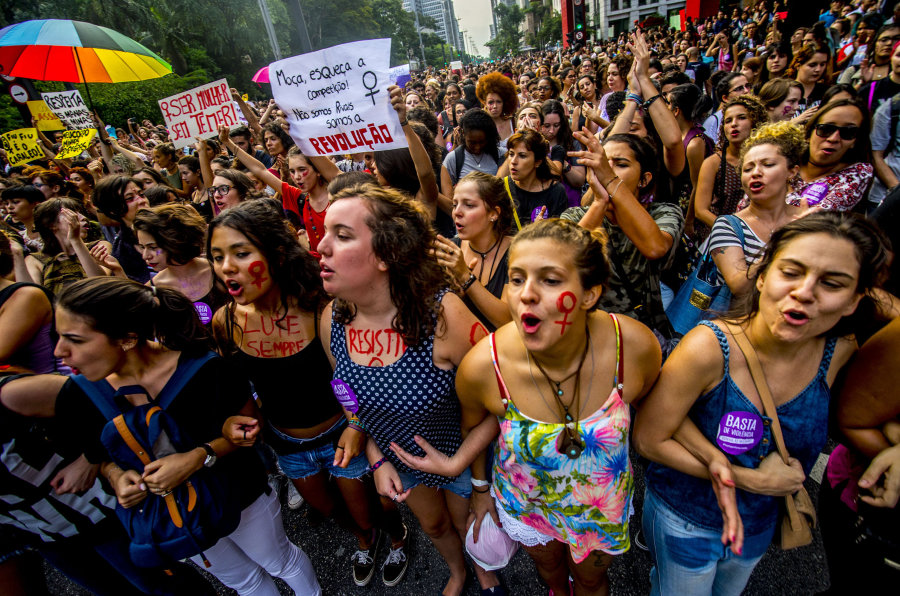In Brazil abortion is only legal in cases of rape incest to save a womans life and since 2012 in the case of anencephalya fatal condition in which infants are born without parts of the brain or skull. Terminations are only allowed in cases of rape when the mothers life is at risk or when the foetus has the defect anencephaly - a rare condition that prevents.
 Legal Abortions In Brazil 2017 Statista
Legal Abortions In Brazil 2017 Statista
There are only a handful of exemptions to the ban on abortion to save the mothers life if the pregnancy was a result of rape or in a recent controversial addition if the foetus has.

Brazil abortion law. Federal Decree 70372009 approved the National Human Rights Plan recommending that abortion be treated as a case of public health and that a monitoring system for cases of legal abortion be established. Women who terminate their pregnancies can face prison. There are currently only three situations in which an abortion can be legally conducted in Brazil.
Abortion in Brazil is a crime with penalties for 1 to 3 years of imprisonment for the pregnant woman and 1 to 4 years of imprisonment for the doctor or any other person who performs the fetus removal procedure on someone else. Brazil Penal Code page 54 WHO Guidance. If the pregnancy is a result of rape if performing an abortion is the only way to save the womans life or if the fetus suffers from.
Abortion is restricted to a specified reason to get one but gestational and other requirements apply. The following descriptions and recommendations were extracted from WHO guidance on safe abortion. 4 Prompted by the opportunity of the drafting of the new democratic constitution in 1986-1987 ac-tors with.
In cases of risk to womans life. Rape or incest If the life of the pregnant woman is at risk The fetus has anencephaly. In the latter case the pregnant woman must consent or if she is incompetent her legal representative must consent.
Studying the regulation process which accompanied the implementation of these services from the late 1980s onward the present article describes the emergence of a government by standards applied to legal as well as. If she was raped if there is a congenital brain disorder with the fetus or if the mothers life is in danger. The legality of the performance of abortion in Brazil is governed by the Brazilian Penal Code dating from 1940.
In Uruguay Cuba and Guyana abortion is already permitted by law. The ruling which was handed down by Polands constitutional tribunal court in October states that abortions may only be permitted in cases of rape incest or when the mothers life is in danger. Such laws range from abortion being freely available on request to regulation or restrictions of various kinds to outright prohibition in all circumstances.
Women and girls who. Over the past decade Brazils health system has. Constitutionalizing abortion in Brazil Revista de Investigações Constitucionais Curitiba vol.
Under Brazils penal code abortion is only permitted to save the pregnant womans life or where the pregnancy is the result of rape or incest. To preserve healthon socioeconomic grounds. Brazil has strict laws on abortion.
The fulfillment of human rights requires that women can access safe abortion when it is indicated to protect their health. Abortion is allowed when it saves the mothers life preserves her physical or mental health and for socio-economic reasons. Under the Code a physician may perform an abortion when it is the only means to save the life of the pregnant woman or when the pregnancy is the result of rape.
Abortion is legal in Brazil only in cases of rape when necessary to save a womans life or when the fetus suffers from anencephaly a fatal congenital brain disorder. Abortion laws vary considerably between countries and have changed over time. 187 The Penal Code regulation of abortion has been challenged by social move- ments through different strategies especially since the end of the 1970s.
In Brazil abortion is decriminalized in three cases. In three specific situations in Brazil induced abortion is not punishable by law. Abortion in Brazil is considered a crime.
Abortion continues to be a controversial subject in many societies on religious moral ethical practical and political grounds. SÃO PAULO A court order allowing a 10-year-old to get an abortion in Brazil was a heinous crime according to the president of the countrys bishops conference. In Brazil however the practice is outlawed in almost all cases and the existing legislation casts a spotlight over the deep socioeconomic and racial cleavages in the country.
In Brazil a woman can only legally get an abortion under three circumstances. The plan also pushes for the decriminalization of abortion recognizing womens right to decide over their bodies. Brazil is one of the few countries with restrictive abortion laws to have implemented specialized hospital services to attend patients eligible for non-criminal abortion.











